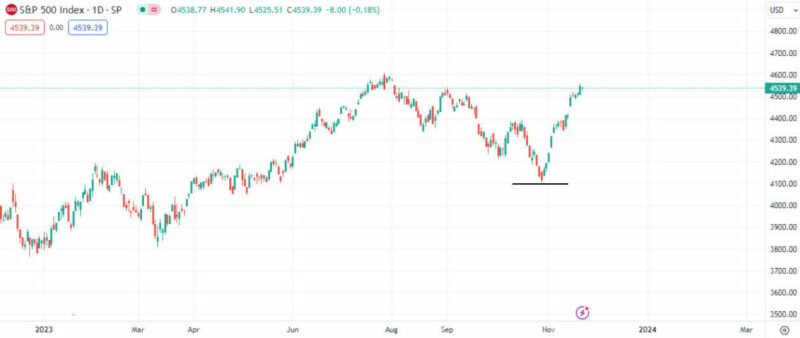Investors remain optimistic that the market can resume its bullish momentum in December given that the fourth quarter has historically been one of the best three-month stretches of the year for the S&P 500. Investors anticipated the Federal Reserve may have already reached its terminal interest rate; however, the primary driving forces affecting stock prices over recent weeks, inflation and interest rates, will continue to hold significant importance in December.

Positive information is that the annual rate of inflation measured by the Consumer Price Index (CPI), which monitors the expenses of a variety of goods and services – slowed to 3.2% in October, dropping from September’s 3.7% and marking the most subdued rate since July 2023. It is also important to say that inflation is significantly lower than 2022 peak levels which were above 9% and because of this many investors anticipate the Fed could begin to cut interest rates as soon as the first half of 2024.
See Related: Federal Reserve Officials Banned From Trading Crypto(Opens in a new browser tab)
GDP And Corporate Profits
Corporate profits are also the big driver of what the market is likely to do in the near term and because of this investors are closely monitoring third-quarter U.S. earnings. Third-quarter earnings season is essentially at the finish line and of the 480 companies that have reported so far, 80% have beaten analysts’ expectations. The inflation and interest rates will continue to significantly impact stock prices in December.
U.S. economic growth(inflation and interest rates) has been resilient year-to-date and Bill Adams, a chief economist for Comerica Bank, recently said the U.S. economy has been much stronger in 2023 than economists expected. Bill Adams suggests that the annual real GDP is anticipated to reach approximately 2.4% this year, a substantial increase from the Federal Reserve’s December 2022 dot plot prediction of 0.5%. However, he also warned that the outcome in the upcoming months will decide if the U.S. economy can smoothly achieve a so-called “soft landing” without veering into a recession.
Deceleration In United States Economic Growth
Jeffrey Roach, the chief economist at LPL Financial, foresees that most of the negative consequences stemming from higher interest rates have not materialized yet and due to this, he anticipates a deceleration in U.S. economic growth. Market expectations that the Federal Reserve will keep interest rates unchanged at its December meeting currently stand above 90% and any information that the Federal Reserve could start to cut rates in the first quarter of 2024 should be positive for stocks in the short-term period.
On the other side, JPMorgan strategists believe that the risk-reward ratio for numerous stocks is currently unappealing and according to them, restrictive monetary policy is likely to remain in place for some time which could potentially cause a recession. Considering this scenario, investors worried about a possible U.S. recession can opt for a more defensive strategy in the market. They can enhance their financial flexibility by reducing their stock or cryptocurrency exposure and augmenting their cash reserves.



